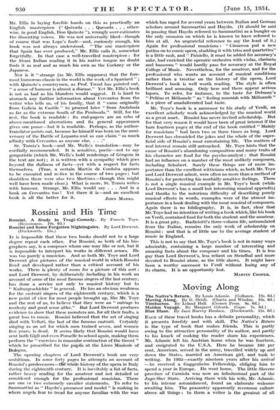Rossini and His Time
Rossini. A Study in Tragi-Comedy. By Francis Toye. (Heinemann. 10s. 6d.)
Rossini and Some Forgotten Nightingales. By Lord Derwent. (Duckworth. 15s.)
IT is impossible that these two books should not to a large
degree repeat each other. For Rossini, as both of his bio- graphers say, is a composer whom one may like or not, but it is impossible to interpret his works in different senses. He was too purely a musician. And so both Mr. Toye and Lord Derwent give pictures of the musical world in which Rossini lived and developed rather than a critical account of his works. There is plenty of room for a picture of this sort : and Lord Derwent, by deliberately including in his work an account of some of the most famous singers of the last century, has done a service not only to musical history but to " Kulturgeschichte " in general. He has an obvious weakness
for the castrati singers of the eighteenth century, which is a 'new point of view for most people brought up, like Mr. Toye and the rest of us, to believe that they were an " outrage to modesty and good sense alike." But Lord Derwent produces evidence to show that these monsters are, for all their faults, a great loss to music. Rossini believed that the art of singing
died with Velluti, the last of the. famous castrati. Certainly singing as an art for which men trained seven, and women
five years, is dead. It seems likely that 'Rossini would have sent both Gigli and even Ponselle to school again, making them perform the " exercises in muscular contraction of the throat " which he prescribed for the ptipits ,at the Liceo Musicale of
Bologna. - - • .
The opening chapters of Lord- Derwent's book are very ambitious. In some forty pages he attempts an account of Rossini's predecessors--.W whole •history-of the opera in Italy during the eighteenth century. It is inevitably a list of. facts, ' rather heavy reading for the amateur' and not detailed or
considered enough for the professional musician. There are one or two extremely cavalier statements. To refer to Sammartini as " Haydn's precursor and model " is rushing in where angels fear to tread for anyone familiar with the war which has raged for several years between Italian and German scholars around Sammartini and Haydn. (It should be said in passing that Haydn referred to Sammartini as a bungler on the only occasion on which he is known to have referred to him at all. An ungrateful reference to say the least of it.) Again for professional musicians : " Cimarosa put a new patina on to comic opera, studding it with trios and quartettes" is a little rash, and " Paisiello, it must be added for accuracy's sake, had enriched the operatic orchestra with violas, clarinets and bassoons " would hardly pass for accuracy at the Royal College of Music. Nevertheless, for the amateur, and for the professional who wants an account of musical conditions rather than a treatise on the history of the opera, Lord Derwent's book is well worth reading. The style is often brilliant and amusing. Only here and there appear serious lapses. To refer, for instance, to the taste for Debussy's " Pelleas et Melisande " as " feeling moonish with Melisande " is a piece of unadulterated bad taste.
Mr. Toye's book is a successor to his study of Verdi, an excellent scholarly work acknowledged by the musical world as a great asset. Rossini has never invited scholarship. But for that very reason it would have been of great interest if the bare fourteen pages at the end of the book' entitled " Mainly for musicians " had been two or three times as long. Lord Derwent has chronicled the jokes and the whole of the super- ficial side of Rossini's most entertaining life. The matters of real interest remain still untouched. Mr. Toye hints that the cause of Rossini's abandoning composition and many traits of his character are food for the psycho-analyst : that Rossini had an influence on a number of the most unlikely composers, including Schubert. Surely these things are of more im- portance than the excellent witticisms which, as both Mr. Toye and Lord Derwent admit, were often no more than a method of Rossini's for protecting his morbidly sensitive feelings. There is not a single musical example in Mr. Toye's book (while Lord Derwent's has a small but interesting musical appendix) and thanks to the notorious difficulty of describing purely musical effects in words, examples were of the utmost im- portance in a book dealing with the most musical of composers. Again there is no bibliography. It is, in fact, clear that Mr. Toye had no intention of writing a book which, like his book on Verdi, contained food for both the student and the amateur. It is a great pity. Radiciotti's three-volume life, untranslated from the Italian, remains the only work of scholarship on Rossini : and that is of little use' to the average student of music in England.
This is not to say that Mr. Toye's book is not in many ways admirable, containing a large number of interesting and amusing facts about the composer and his times. It is less gay than Lord Derwent's, less reliant on Stendhal and more devoted to Rossini alone, as the title shows. It might have been a worthy successor to Verdi without losing any of its charm. It is an opportunity lost.
MARTIN COOPER.
















































 Previous page
Previous page